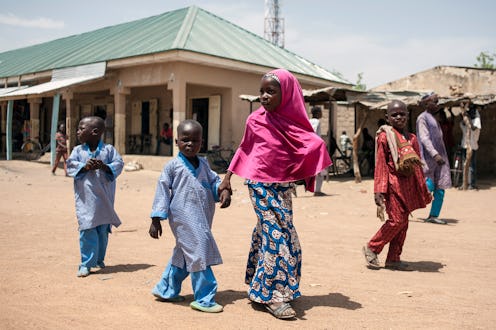News
2 Years Later, The Chibok Girls Are Still Missing
On April 14, 2014, the Nigerian terrorist organization Boko Haram raided a school in the town of Chibok, kidnapping 276 girls; sadly, where they are two years later still leaves too many questions. Most of the Chibok girls are still held captive, though 57 managed to escape. What do we know about the 219 girls who are still held captive, and what is being done to return them home?
Boko Haram members arrived in Chibok that night two years ago and raided the Government Girls Secondary School while the girls slept in dormitories, CNN reported. The members reportedly exchanged gunfire with soldiers who were guarding the school before entering the campus and loading the students into buses, vans, and trucks. One of the students who managed to escape told CNN that she and several others did so when one of Boko Haram's vehicles broke down the night of the kidnapping.
In 2014, Human Rights Watch released a report detailing the accounts of 30 people who had been abducted by Boko Haram, including 12 of the escaped Chibok girls. They reported an array of abuses, including rape, forced marriage, physical abuse, and forced participation in military operations. In 2015, Boko Haram agreed to release the 219 girls still held captive in return for the release of 16 of their militants being held by the government, the Daily Mail reported. The deal did not go through.
The organization's name "Boko Haram" means "western education is forbidden," The Sunday Times reported. The group, which pledges allegiance to the Islamic State, according to BBC News, was labeled the deadliest terror group by the Global Terrorism Index in 2015. Atrocities like the Chibok kidnappings are not rare. The terrorists are known for attacking villages, murdering the men, and kidnapping the women (including young girls) as sex slaves, The Sunday Times reported. By both abducting students and burning schools down, Boko Haram is estimated to have put 1 million children out of school.
The Bring Back Our Girls movement was begun by Nigerian citizens in response to the Chibok kidnappings. They work continuously to spur the government to aggressively search for the kidnapped schoolgirls as well as to put protections in place for rescued or escaped captives, to secure them counseling and health services, and to ensure the prosecution of kidnappers who commit sexual violence. The organization has been putting pressure on Nigerian 2015-elected President Muhammadu Buhari, elected in May 2015, to make the rescue of the Chibok girls a top priority.
Bring Back Our Girls suggests different types of activities people can participate in to help their cause, both in Nigeria and around the world, including rallies, sit-ins, and teach-ins. The organization is promoting several events on Thursday in Nigeria, including a protest and press conference at the presidential villa and marches in Lagos and Osogbo. There will also be a vigil and protest march at the Nigerian House of the Tillman Chapel Church Center for the United Nations in New York.
President Buhari announced his administration would launch an investigation into the Chibok girls' whereabouts after a Bring Back Our Girls march on the presidential villa in January 2016. NG Latest reported that about 136 parents of kidnapped girls were present. The marchers were met by a group of government delegations, but demanded to speak directly with Buhari, and he eventually agreed. After meeting with members of the group following the protest march, Buhari said in a statement:
Securing the Chibok girls is my responsibility. The service chiefs and heads of our security agencies will tell you that in spite of the dire financial straits that we found the country in, I continue to do my best to support their efforts in that regard.
Buhari's investigation includes a panel to collect information on the circumstances surrounding the kidnappings, as well as to determine what had and had not been done by the previous administration to track down the girls, Reuters reported. As of April, there have been no updates on the investigation.
Little is known about the current condition of the Chibok girls, but there are signs that they are still alive. A sign of hope came in January 2016 when parent Dauda Yama found a missed call on his phone from his daughter Saratu, who was among the girls kidnapped from the Chibok school. And on Wednesday, CNN reported that it obtained a video featuring 15 of the Chibok girls alive. The two-minute video concluded with Naomi Zakaria, one of the abductees, reportedly stating, "I am speaking on 25 December 2015, on behalf of the all the Chibok girls and we are all well." The date Zakaria said matches that embedded in the video, CNN reported, also noting that Zakaria emphasized the word "all," suggesting she spoke not only for the 15 girls featured in the video, but for the other abductees as well.
The U.S. government released a statement on Tuesday in anticipation of the second anniversary of the Chibok girls' abduction, saying that the nation "calls for the immediate release, without preconditions, of all hostages held by Boko Haram. The kidnapping of these young women, along with the kidnappings of countless others by Boko Haram, epitomizes this terrorist group's depravity." The statement also said that the U.S. government continues to provide advisory and intelligence support to the Nigerian government, as well as financial support for services to refugees and those affected by violence in their communities.
The Chibok girls are not being forgotten by the Nigerian community, which faces constant violence and tragedy in various forms from Boko Haram. At the 2015 Women in the World Summit, Bring Back Our Girls founder Obiageli Ezekwesili implored the audience, "Please don't go to sleep on our Chibok girls." Bring Back Our Girls continues to pressure the Nigerian government to do all it can to find their children, and to keep the girls in the spotlight all over the world.
